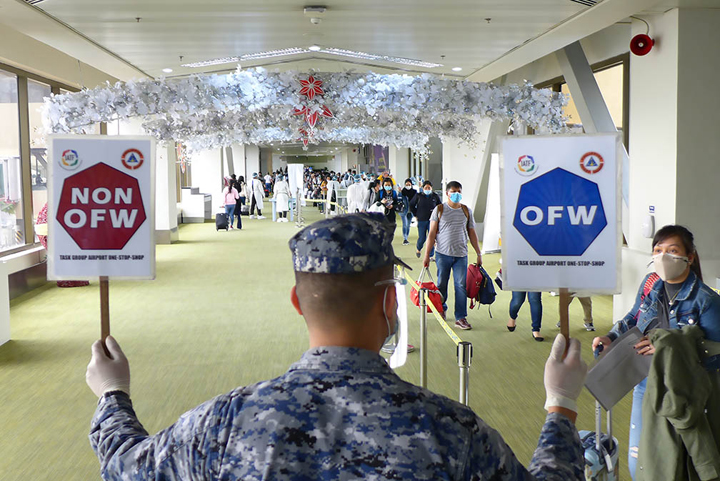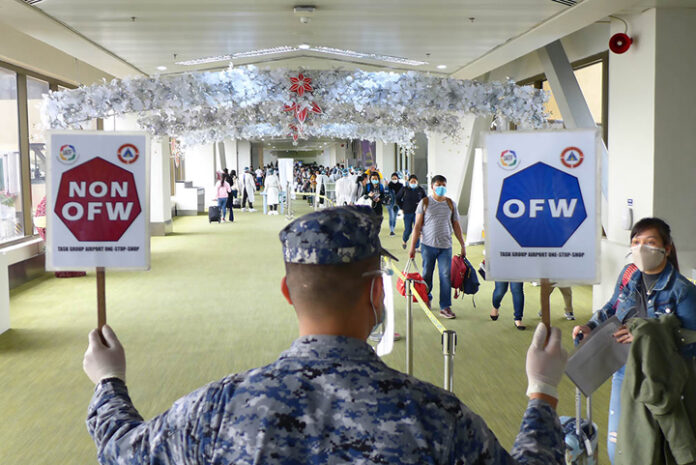
THE gradual reopening of economies and the stimulus packages of host countries have helped Filipino migrants send remittances to their families during the pandemic, according to experts.
In an Asian Development Blog, Asian Development Bank (ADB) Economic Research and Regional Cooperation Department Economists Aiko Kikkawa Takenaka and Kijin Kim, as well as consultant Raymond Gaspar, said the strict public health protocols helped boost inflows to remittance-receiving countries like the Philippines.
Executive Director Jeremaiah Opiniano of the Institute for Migration and Development Issues agreed, saying Filipinos who are permanent residents abroad and were entitled to receive stimulus packages from foreign governments sent remittances to help their families cope during the pandemic.
“Takenaka was correct that some countries (like Sri Lanka and Bangladesh I think) have prodded their compatriots abroad to send more through incentives. The Philippines need not do that because remittance sending has been a cultural trait and a familial responsibility,” Opiniano told the BusinessMirror in an e-mail.
“She was also correct that episodes of eased mobility transitions and re-opening of the economies in host countries allowed for some income earning by residents and foreigners. The stimulus packages of host countries may have also helped some migrant workers and foreign-born permanent residents and naturalized citizens,” he added.
Takenaka, Kim and Gaspar added that even OFWs who received assistance from their host countries through extended social assistance programs were able to send funds to their families during the pandemic.
With this, the ADB experts said the majority or 84 percent of over 3,000 overseas Filipinos in the United Kingdom, the United States, Canada and Australia planned to remit the same amount or more money during the holidays.
In the Philippines, Opiniano said January-to-November figures showed that Filipinos abroad sent $27.012 billion, or some 0.80 percent less year-on-year.
“The availability of social assistance to migrant workers allowed them to continue sending money home. This was especially true among migrants from many developed countries, which have supplemented existing unemployment insurance and expanded access social assistance programs,” Takenaka, Kim and Gaspar said.
However, Opiniano said the role of exchange rates in the value of remittances and the stability of these inflows cannot be overlooked.
He said in countries like Bangladesh and Pakistan, the exchange rate depreciated; both are remittance-receiving nations. In the Philippines, the opposite occurred during the period.
He said the Philippine peso appreciated to P48.06 to the dollar in December 2020 from P52.47 in January 2019.
“Sure, the Bangladeshi, Pakistani and Sri Lankan migrants may have sent more money in 2020. But it does not mean that their welfare while abroad is better off,” Opiniano said. “It also seemed that the savings of these migrants have been wired home. We wonder how much migrants have left.”
Help returnees
Takenaka, Kim and Gaspar said in order to cope, particularly during times when remittances could be disrupted, governments must prepare to help returned migrants and their households.
They need assistance, Takenaka, Kim and Gaspar said, because migrants who returned home because they were pre-terminated or their contracts ended often face difficulties securing new jobs overseas or at home.
The government should help them by providing job referrals, skills training or certification, and entrepreneurship training.
This, the writers said, will prevent their households from falling into poverty. Without jobs, OFWs and their families have less or no income to sustain their needs, especially that of vulnerable members of their family—older persons, persons with disabilities.
“The recent strong remittance figures should not be seen as a reason to return to business as usual. Rather, they are an opportunity to strengthen the systems that help overseas workers and their families back home,” Takenaka, Kim and Gaspar said.
Apart from these, Opiniano said origin-country governments should prepare migrant health-related programs as well as economic and social reintegration measures for returning, deported and repatriated migrants.
Improving the ease of doing business in the Philippines, Opiniano said, is also one way to guide OFWs in their investments. This would also help those who chose to stay and become entrepreneurs.

